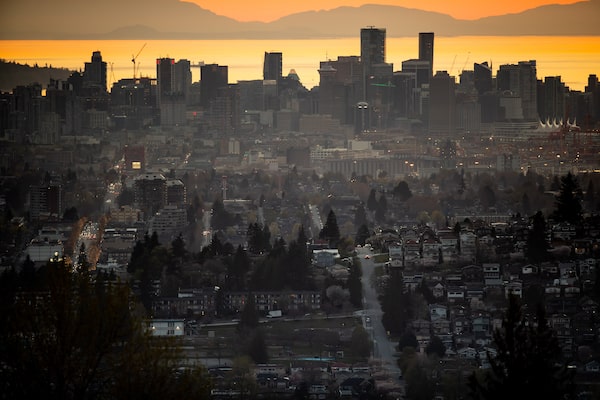
The downtown Vancouver skyline is seen at sunset, as houses line a hillside in Burnaby, B.C., on Saturday, April 17, 2021. The City of Vancouver has made a surprise move to reverse a key part of its climate-action efforts, eliminating its current ban on natural gas-powered heating and cooling systems in new homes.DARRYL DYCK/The Canadian Press
The City of Vancouver has made a surprise move to reverse a key part of its climate-action efforts, eliminating its current ban on natural gas-powered heating and cooling systems in new homes.
The ban has been in place except in very limited circumstances since 2022. The move to reverse the policy was proposed by Councillor Brian Montague who argued that affordability and choice are more important at the moment and questioned whether British Columbia’s electric power system is even capable of handling the demands.
“We all love the environment but we need balance. We also have an affordability crisis,” said Mayor Ken Sim, who called into a council meeting Wednesday from an out-of-town vacation to support the last-minute amendment.
The unexpected decision, which passed by only one vote, got kudos from the building and food-service industries, which say that the requirement for electric-powered heating and cooling systems was driving up costs for new housing and restaurants.
“I thought it was an exceptional decision for affordability and common sense,” said Ian Tostenson, the CEO of the B.C. Restaurant and Foodservices Association, which had joined a large lobby group of businesses opposed to the requirement.
But many other climate-action supporters on and off the council said it was an incredibly short-sighted and too-hasty change that undermines the transformation that both Vancouver and the entire province are making to move the building industry to more environmentally friendly construction.
“It’s a sad day for Vancouver. What this effectively does is undermine the momentum of the industry,” said Green Party Councillor Pete Fry.
He and fellow Green Councillor Adriane Carr, OneCity Councillor Christine Boyle and two of Mr. Sim’s ABC Party colleagues – Lisa Dominato and Peter Meiszner – voted against the last-minute amendment.
Vancouver allows gas-powered fireplaces and cooking appliances, but opponents to the policy say that limited use makes new gas-line installations prohibitively expensive.
The decision to lift the ban will be formalized into a new policy by November. But it’s unclear how much long-term impact it will have since B.C. under the NDP has outlined a series of changes to the building code that will eventually result in no fossil-fuel-powered heating or cooling systems being allowed for new construction or building upgrades by 2030.
Several other cities in the province, including Victoria, Nanaimo, Burnaby and Whistler, have already indicated they are moving toward the final step in the code, which has more stringent requirements than Vancouver’s current policy.
As well, even some in the building industry say Vancouver’s relaxation of the requirements is just a temporary phase that’s needed while BC Hydro works to improve its capacity and processes so that making buildings all-electric is less costly and uncertain.
“I don’t think this is a good long-term policy but the challenge for now has been in the delivery,” said Henri Belisle, president of Burnaby-based TQ Construction and the chair of Homebuilders Association Vancouver.
Builders are having to put in pad-mounted transformers, at a cost of $50,000 per project, as part of the new, more robust electrical systems needed, Mr. Belisle said. And BC Hydro has an outdated policy that calculates electrical use for a building as though every single appliance and utility is on in every unit, which then forces builders to spend more to over-supply power for every project.
The city’s director of sustainability, Brad Badelt, acknowledged that the move will slow the city’s efforts to reduce greenhouse gases, which have already fallen short of targets in previous years.
“It would set us back, potentially tens of thousands of tons of GHGs,” he said, adding that it will probably cause confusion in the building industry.
Mr. Sim questioned Vancouver staff on what the price differential was between all-electric versus natural gas.
Sean Pander, the manager of Vancouver’s green building program said it was the $50,000 transformers, a cost that would be split among units and recovered in lower energy costs over the years.
Among those supporting the council decision were the home builders’ association, the Greater Vancouver Board of Trade and several business groups in an organization called the B.C. Coalition for Affordable Dependable Energy.
Editor’s note: An earlier version of the headline for this story inadvertently used the word "cooking" in place of "cooling." This version has been corrected.